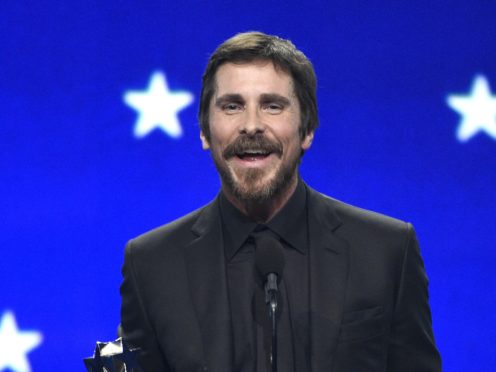Christian Bale and Olivia Colman were among the British winners at the Critics’ Choice Awards.
The awards, handed out by the Broadcast Film Critics Association, honour the best in film and television each year and are considered an accurate indicator of the Oscars.
Bale was the night’s big winner, picking up both the best actor and best actor in a comedy prizes for his role in political biopic Vice.
Bale underwent a drastic physical transformation to play controversial vice president Dick Cheney.
Accepting the comedy prize, Bale said: “I guess time sort of allows it to be considered a comedy, but it’s really a tragedy.”
A week earlier at the Golden Globes, Bale compared Cheney, who was instrumental in the US’s foreign policy in the wake of 9/11, to Satan.

Bale won the overall best actor gong ahead of A Star Is Born’s Bradley Cooper.
Norwich-born Colman, fresh from her success at the Golden Globes, strengthened her Academy Awards credentials by picking up the best actress in a comedy prize, ahead of fellow British performer and Mary Poppins Returns star Emily Blunt.
However, she lost out on the overall best actress award, which was a tie between Glenn Close for The Wife and Lady Gaga for A Star Is Born.

Roma, Alfonso Cuaron’s semi-biographical black-and-white film, was named best picture.
It won ahead of Black Panther, BlacKkKlansman, The Favourite, First Man, Green Book, If Beale Street Could Talk, Mary Poppins Returns, Roma, A Star Is Born and Vice.
First Man star Foy, who was nominated for best supporting actress, delivered a powerful speech while accepting the #SeeHer award in recognition of her contribution to women in film.
She said: “I accept this award as an encouragement to myself to be brave enough to face and see myself, and by doing, hopefully, I can understand and see others, and ultimately I can help others to see themselves.”

Viola Davis, who received the award in 2016, presented the honour to Foy, which represents the #SeeHer movement, aiming to “accurately portray” women and girls in film.
Foy was beaten to best supporting actress by If Beale Street Could Talk star Regina King, who won in a category also containing Amy Adams, Nicole Kidman and The Favourite stars Emma Stone and Rachel Weisz.
Ben Whishaw added to the British winners list when he picked up the best supporting actor gong in a limited series or movie made for television.
The actor was recognised for his role in A Very English Scandal, in which he stars opposite Hugh Grant.
Thandie Newton won best supporting actress in a drama series for her role in Westworld while Matthew Rhys took home the male equivalent for The Americans.
And the BBC’s drama Killing Eve was also recognised, with star Sandra Oh named best actress in a drama series.

In her acceptance speech, she paid tribute to Liverpool-born co-star Jodie Comer.
Lady Gaga paid a tearful tribute to her A Star Is Born co-star Bradley Cooper as she won best original song for Shallow, the hit song from the musical drama.
She said: “I’ll never forget playing it for Bradley for the first time and seeing his face light up and then singing it live together, take after take.”
Cooper, who made his directorial debut on the movie, missed out on the best director gong, which instead went to Roma filmmaker Alfonso Cuaron.
Green Book star Mahershala Ali added to his Golden Globes success from earlier this month by picking up the best supporting actor gong.
Ali plays jazz musician Don Shirley and dedicated the prize to Green Book’s composer, Kris Bowers.

On stage, Ali said: “I really appreciate you brother.”
British actor Richard E Grant was also nominated for his role in Can You Ever Forgive Me?, as were Beautiful Boy’s Timothee Chalamet, BlacKkKlansman’s Adam Driver, A Star Is Born’s Sam Elliott and Michael B Jordan for Black Panther.
The Favourite, which led the way in nominations with 14, won the best acting ensemble prize. Best original screenplay went to Paul Schrader for First Reformed while best adapted screenplay went to Barry Jenkins for If Beale Street Could Talk.
Crazy Rich Asians won best comedy.
